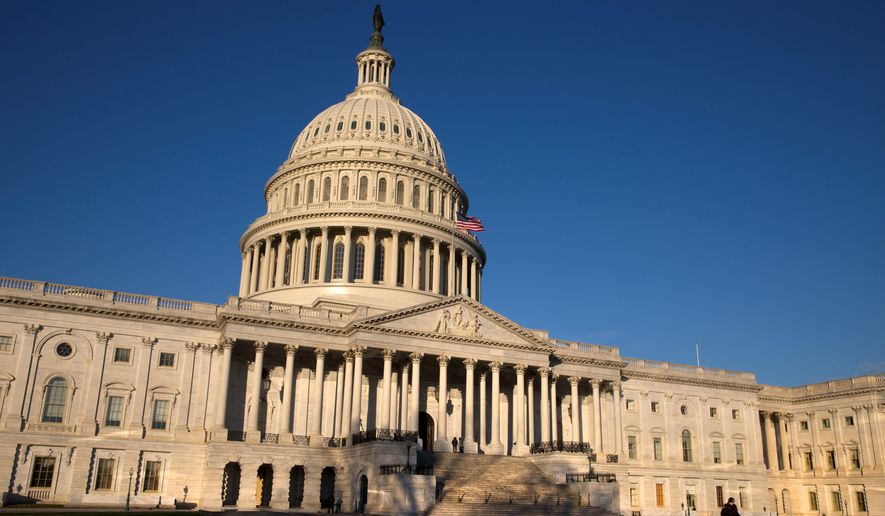Big-ticket items like an Obamacare repeal or tax reform may elude them, but lawmakers are still off to a fast start to the current Congress, according to The Washington Times Legislative Activity Index, which shows a newly unified government in Washington passing bills at a clip not seen since the early days of the Obama administration.
It’s the House that has led the way, notching a legislative record that puts it in the top 25 percent of sessions of Congress dating back to just after World War II, when the Congressional Record began to publish monthly tallies of floor activity.
Yet the Senate continues to lag, with lawmakers in the upper chamber ranking near the bottom of the past 71 sessions of Congress when it comes to the number of bills cleared by the chamber, volume of floor activity and — perhaps most striking — the slow pace of confirmations.
On that last measure, it’s the second-worst start to a year on record and by far the worst start to a presidential term.
It’s causing friction between the two chambers. Republican leaders said Wednesday that 226 bills have cleared the House but are now piled up in the Senate, stuck in gridlock.
Those measures include a crackdown on sanctuary cities and repeat illegal immigrants, a rewrite of the 2010 Wall Street reform law and even an Obamacare repeal, which the House approved — after a false start — in May.
The House on Wednesday passed bills cracking down on human trafficking and is moving the dozen annual spending bills through the Appropriations Committee.
“Obviously, we’re far ahead of the pace,” Speaker Paul D. Ryan, Wisconsin Republican, said Tuesday. “The House, as you know, institutionally can move a lot faster than the Senate. The House also does not have to deal with personnel, with ambassadors and assistant secretaries and all the rest, or the Supreme Court.”
Some significant bills have cleared both chambers and been signed into law, including an overhaul of accountability rules for the Department of Veterans Affairs and the repeal of Obama-era regulations.
But Democrats said the list of basic bills remaining is stunning.
The deadline for a 2018 budget was April 15, yet neither chamber has written one. Infrastructure — an issue on which both sides of the aisle thought they could reach bipartisan agreement — also has fallen by the wayside. In addition, deadlines are looming in the fall for raising the debt limit and avoiding a government shutdown.
“Republicans have yet to pass a single appropriations bill. There’s also been no jobs bill, no infrastructure bill, no budget, and no plan to avert a catastrophic default on the full faith and credit of the United States,” the office of Minority Leader Nancy Pelosi, California Democrat, said in a memo Wednesday.
The lack of a budget is a particular black eye for Republicans, who in previous years mocked Democrats for their inability to pass a blueprint. At one point, the Republican-led House even forced through the No Budget, No Pay Act of 2013, which withheld lawmakers’ pay until they approved a budget for the next fiscal year.
Mr. Ryan has predicted that this could be the most productive Congress in modern history. Just weeks ago, he said it’s already “the most productive Congress since the mid-’80s.”
The Times’ Legislative Activity Index doesn’t bear that out. According to the index, which uses Congressional Record statistics to evaluate the overall pace of activity on the chamber floors, 2017 ranks 57th out of the 71 years for which records exist.
Taken alone, the House, which Mr. Ryan oversees, was fairly active, clearing some 260 bills and joint resolutions through the chamber and having 29 of its bills signed into law.
Senators, though, lagged well behind, notching the fifth-worst year on record. Particularly damaging to senators was the lack of action on nominations, making 2017 the second-worst year on record through the first six months. The only worse year was 1999.
The nomination gridlock has grown so bad that Democrats over the past couple of weeks mounted a filibuster of a federal judge who was originally nominated by President Obama.
David C. Nye, a state court judge in Idaho, was nominated to the federal bench in April 2016, but his nomination stalled as the end of Mr. Obama’s tenure neared. Mr. Trump renominated Judge Nye in May.
The judge was finally approved on a 100-0 vote Wednesday, but only after Democrats, in addition to forcing a filibuster vote, made the Senate run the clock on 30 hours of debate time on a nomination they unanimously supported.
Majority Leader Mitch McConnell, Kentucky Republican, said if Democrats continue that level of obstruction, it would take the chamber more than 11 years to get a full administration in place.
“This is not about changing an outcome; it’s about wasting time to make it more difficult for the president to make appointments,” he said Tuesday, chastising Democrats for the delays.
Minority Leader Charles E. Schumer, New York Democrat, countered that Republicans shared the blame because they controlled the Senate last year and could have sped Judge Nye’s nomination through the chamber. But Republicans were intent on blocking Obama court picks, confirming fewer than any other Congress in nearly 60 years.
Mr. Schumer said Republican complaints were an attempt “to shift the blame and attention away from their health care bill.”
• Stephen Dinan can be reached at sdinan@washingtontimes.com.




Please read our comment policy before commenting.